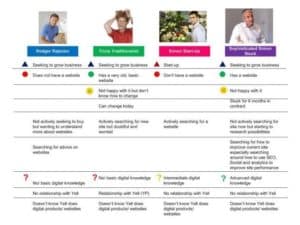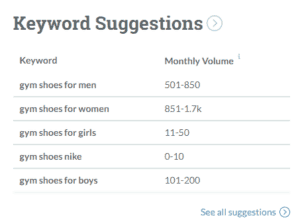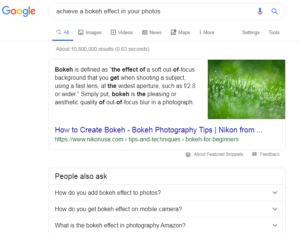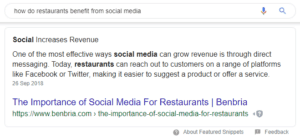
Alexa Lemzy, customer service manager and blog author, TextMagic
Competing for the right keywords is critical to the growth of any online business. Keyword research makes sure you are using the right keywords to reach the people who need your business and are ready to buy.
These 7 tips will help you compete for keywords and reach potential customers close to a buying decision.
1. Focus on Intent over Volume
Before deciding to compete for any keyword, consider the intent of the people searching it. The intent of a search can usually be placed into one of four basic categories:
· Navigation
The user is trying to reach a specific site or page, and is using Google instead of entering a URL. Common search modifiers indicating a navigational intent include product and business names, ‘login’ and ‘signup’.

· Information
The user wants information about a topic or an answer to their question. This can range from simple factual queries to in-depth explanations or advice on a subject. While searchers in this category may be in the market for your products and services, in an informational search they are aiming to learn more about your industry, not compare products or make a purchase.
An informational search may include terms like ‘how’, ‘why’, ‘ideas’ or ‘guide’.
· Investigative
The user wants to purchase a particular type of product or service, but is unsure which the best option for them is. They are probably trying to find reviews, comparisons and lists of the best products.
· Transaction
The user has all the information they need to know what they want, and they are ready to buy. A transaction search aims to find somewhere to buy it from. It may also have the goal of finding the best deal for that product, and often includes modifiers such as ‘cheap’, ‘discount’ or ‘sale’.
Some keyword research tools, such as Alexa, offer a filter to identify potential buyer keywords during research.

Bringing lots of visitors to your site doesn’t help you much if none of them want to buy. Even if a keyword only gets 20 monthly searches, if half of those searchers are ready to buy it could be a worthwhile investment, and often easier to rank for.
The content you use to target a keyword should match up with the intent of users searching that term. For example, search terms using phrases like ‘what are the benefits of’ or ‘why do I need’ should lead to educational content that prepares potential customers to make an informed purchase.
Google attempts to determine the intent of every search and provide results accordingly. When searching your target keywords, you can usually identify the intent results are trying to serve
A search for solutions to a specific problem, or for the best provider of a product or service, should lead straight to a product page detailing the benefits and specifications. Users searching these terms already have a good idea what they want, and are ready to buy it.
2. Create User Personas
Different demographics search and respond to different keywords for the same products and services. To help you tailor your keywords to each audience group, it’s useful to create user personas.
A user persona is your perfect example of the average person in each of your target demographics. This persona should cover all potentially relevant details about a customer, including:
- Age
- Gender
- Relationship status
- Parenthood status
- Career
- Hobbies and interests
- Social values
Here are some examples of what your user personas could look like:


Image Source: https://neilpatel.com/blog/user-personas-for-seo/
From these details you can start to infer reasons they might need your services. Think about the goals and challenges your personas might be facing in their career, and the problems they are aiming to prevent.
While not every customer will perfectly fit one of your user personas, this will allow you to target your audience with more specific keywords based on these hypothetical users.
3. Survey Customers and Leads for Keywords
Besides audience personas, you also have real customers who can provide valuable insights on how they first found your business. Customers, and leads who have opted into receiving texts or emails from you, are people you already know are interested in your industry and business.
You should already be tracking the source of your customers and leads either through links and click-throughs, or by asking during the sign-up process. Create a mailing list of those who found you via a search engine and send survey requests via SMS or email to gather information on what they originally needed and the search terms they used. This will make it much easier to identify the keywords that attracted paying customers.
4. Find More Specific Keywords
More specific keywords can result in higher conversion rates. The simple reason for this is that a user making more specific searches has a particular problem or need to address. That means they are more likely to be ready to buy.
This tactic reduces the amount of competition you face to achieve a high ranking. While it also means targeting keywords with fewer monthly searches, more of those searches will create new customers. In addition, when you target very general keywords, it can be hard to know who the people searching that term are, and what they are looking for.
For example, let’s say a sportswear store is targeting the keyword ‘gym shoes’. As you can see, this keyword has a high monthly volume, and a relatively low difficulty to rank for:

So what’s the problem?
Put simply, while there is a good chance of being able to rank for this keyword, the chances of content matching the searcher’s intent are much lower. This keyword just doesn’t provide the necessary information to create content specific to what the user is looking for:
- Are they looking for gym shoes for adults or children?
- Which gender?
- Which brands?
Keyword research tools such as Moz suggest alternative, more specific keywords:

Targeting one of these terms instead may result in fewer searches per month, but the store has a much better idea of what the user wants to find, and can provide content specific to that purpose.
Furthermore, the domain authority of your site can be positively impacted by achieving high SERP positions for keywords with lower volume, provided the content is high quality. This in turn can boost the performance of your content aimed at higher competition keywords.
One method of identifying valuable niche keywords is to research keywords your competitors are not pursuing. This can help you spot keywords where searchers’ needs are not being met, giving you the opportunity to create the content they seek and take a high rank for that keyword.
5. Problem-solving Keywords
Think about the problems you solve or the needs you provide for, and what somebody facing one of those problems might type into Google. If they only know the problem and not the solution, they might not be searching keywords directly related to a specific product.
For example, an amateur photographer might want to produce a particular effect without knowing they need a specific lens to do so. They won’t be searching for lenses because they don’t know yet that they need one, so a business selling camera equipment could see more success at reaching this customer by targeting keywords describing the effect they want to create, or problems that can be caused by using the wrong type of lens. This would allow them to attract customers who don’t yet know what they need in order to educate them and sell the solution.

6. Target Question Searches
Similar to problem-solving searches, users will often phrase their search as a question instead of single keywords.
For example, instead of targeting ‘social media management,’ a business could target:
- How can [industry] benefit from social media management?
- Why is social media management important?
- How do I manage my social media in [industry]?
Use related searches to find popular questions to target:

Researching how your chosen keywords are used in question searches helps your content get found by users searching with a specific intent or problem to solve, and allows you to target more general keywords that would otherwise be out of reach due to the competition.
When targeting a question keyword, it helps to optimize your content for a featured snippet. This is a short paragraph Google will find from your content and display as the most relevant answer when it detects a question. It looks like this:

Aim to address the question succinctly in a short paragraph to increase your chances of getting the featured snippet position. More than 60% of featured snippets are between 40 and 50 words long.
7. Regularly Review Your Keywords
The popularity and monthly volume of search terms is not static, it can change rapidly, often due to unforeseen circumstances. Because of this you should track the volume and click rate of not just the keywords you target, but those used by your competitors and related industries as well. Set up instant alerts on your keyword research tool to get immediate updates on important changes to keyword performance.

In addition to creating new content in response to these changes, often you will be able to repurpose old content with a little editing to prioritize new keywords and phrases. Keeping old content up to date can improve your overall SEO, while leaving old content online might decrease it.
Conclusion
Focus on search intent with niche and problem-solving keywords, keeping your demographic profiles in mind. By using questions and problem-solving keywords you can modify the most popular search terms to achieve better SERP positions for highly competitive keywords.
Keep your content and targeted keywords up to date, as it is important to be able to react to changes in the landscape.
TextMagic specializes in SMS marketing services.